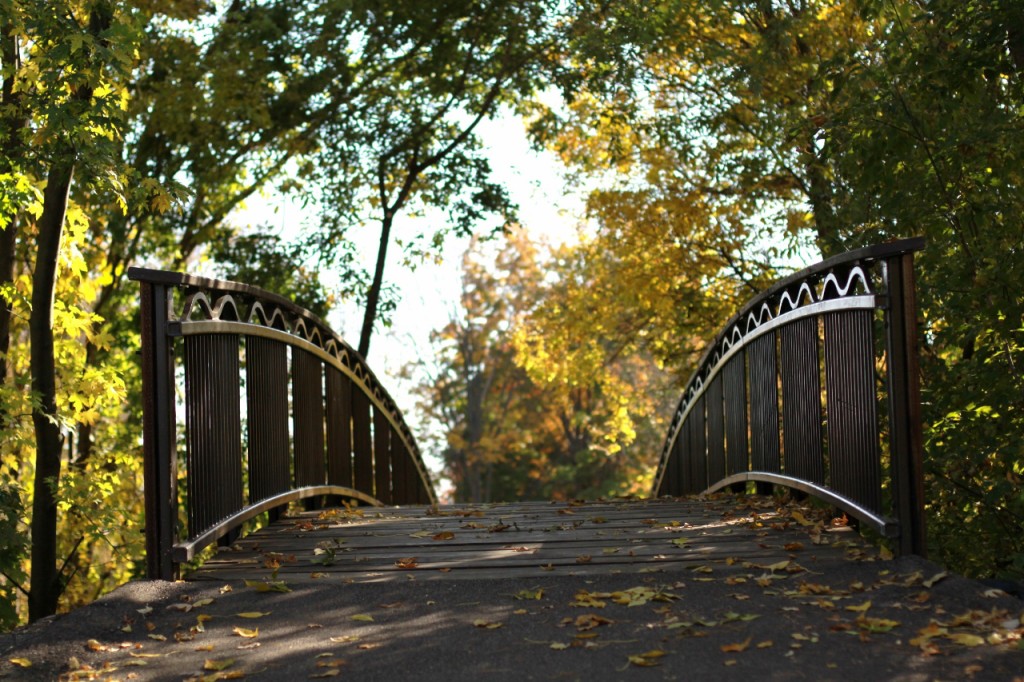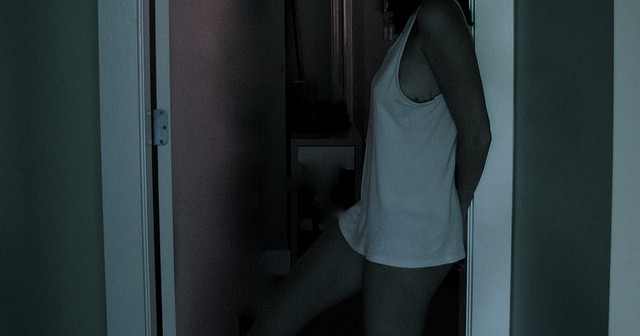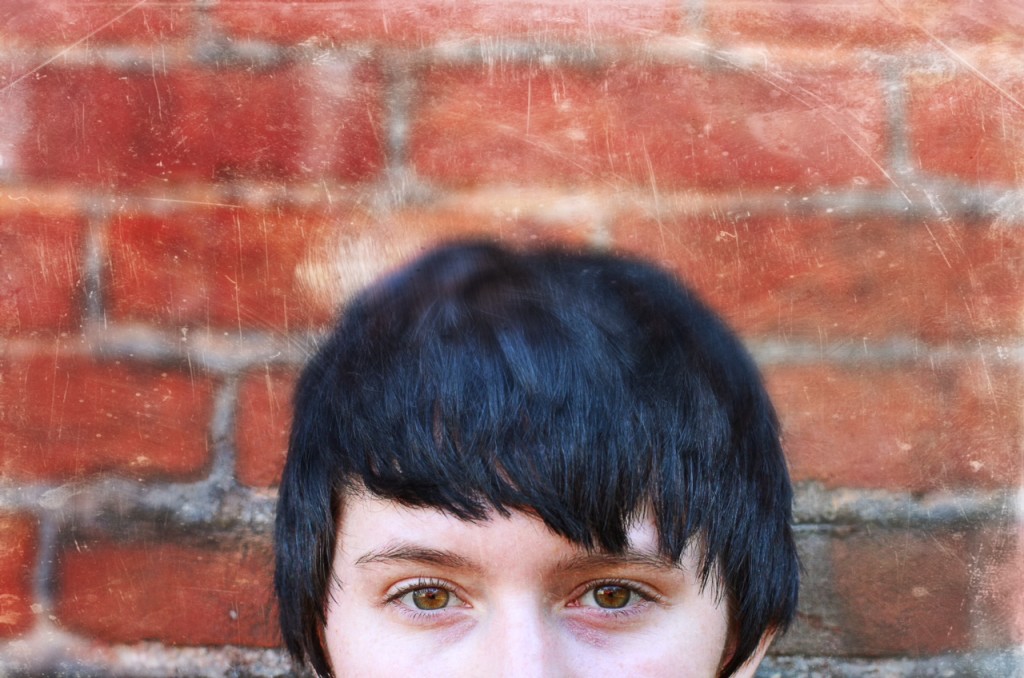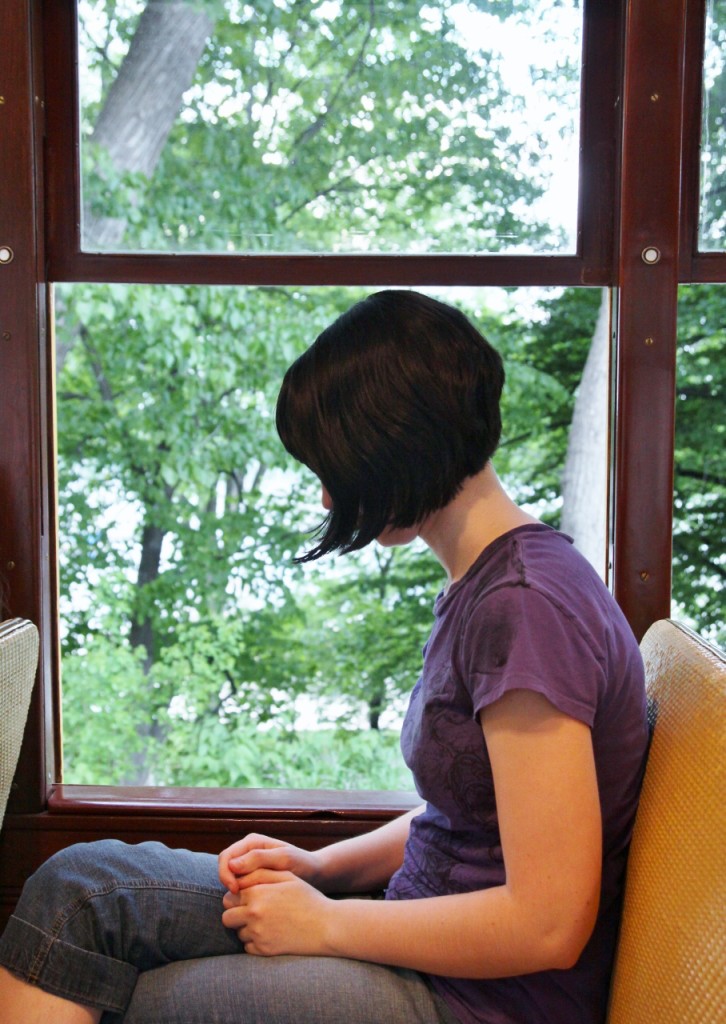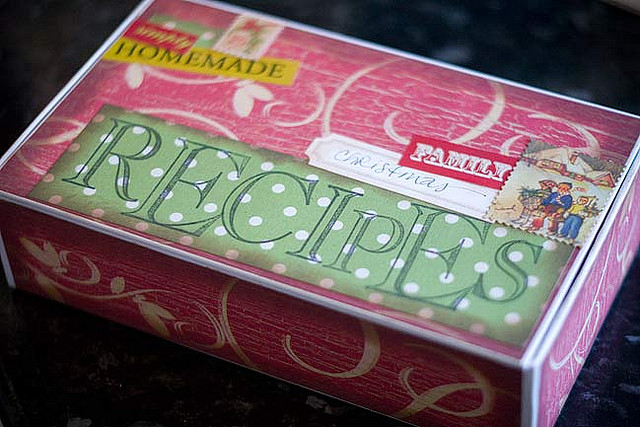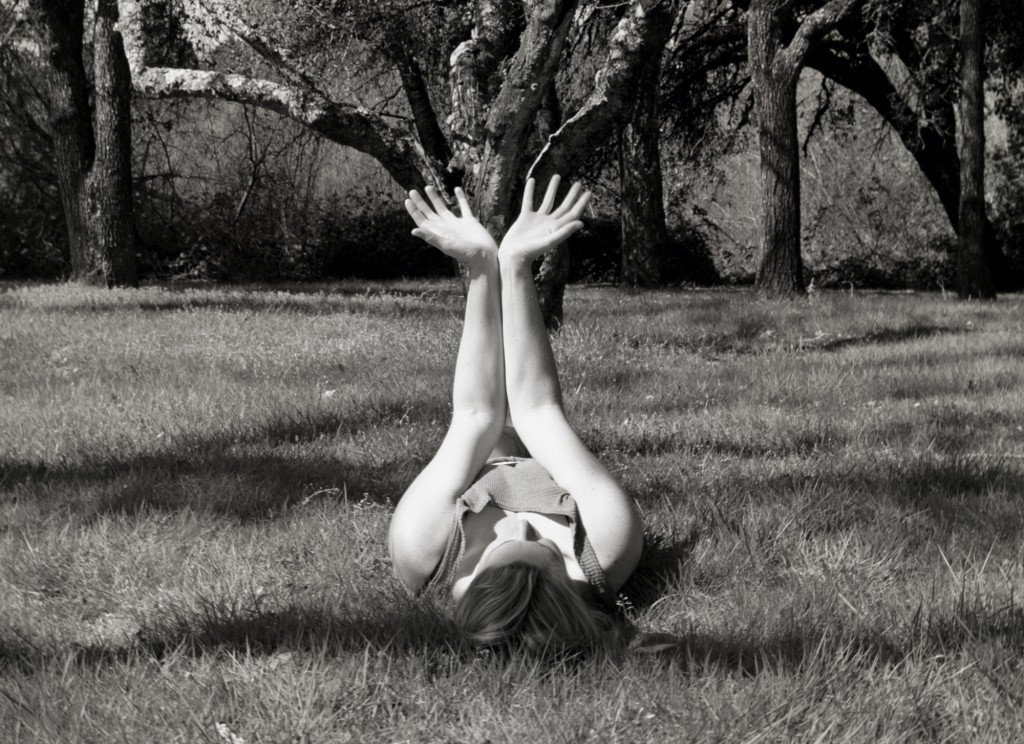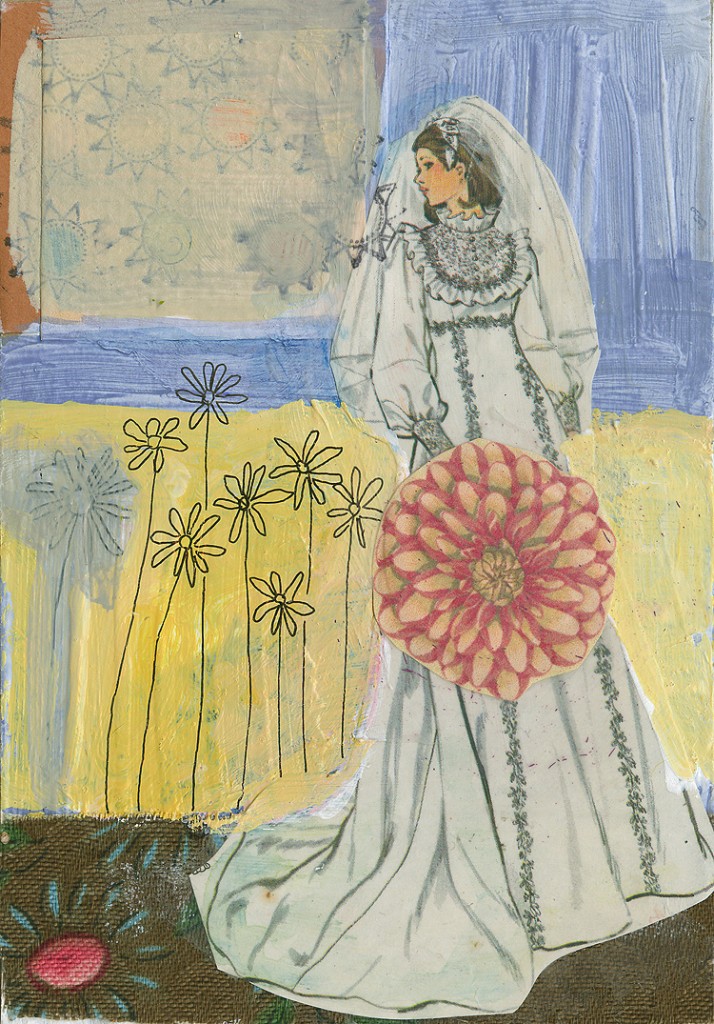
By Laura Laing
Once a year or so, I drive my 2006 Prius out to the county to have it detailed. It’s a ridiculous amount of money to spend on washing a car, especially this one. The back passenger door panel is a slightly different color than the rest, and rust spots are beginning to speckle the roof. The floor mats are wearing through, and the silver paint is beginning to chip away from the steering wheel controls. We bought the car used, and I intend to drive it until it dies.
When I was a kid, my father made me wash his cars in the side yard. I used Comet on the white walls, Windex for the windows, and Palmolive dish soap for the rest. No matter how much I concentrated on swiping away every inch of grime and dust, Daddy could always find a streak of dirt after the sun sucked the finish dry—a memory of dusty roads and a sign pointing to my lack of precision.
This detailing shop gets my car cleaner than anyone could at home, that’s for sure. My favorite thing is the air-pressure tube they use to blow out miniscule bits of lint and salt and sand and dust that collect in crevices and catch my attention while I’m waiting at a stoplight. I try not to see the detritus lining the grooves of the steering wheel or the seams of the dashboard. If I think about it too hard, I’ll dig into the glove box for a plastic knife or toothpick to push along the cracks, pulling up months of grime that gathered by no fault of my own. Or I’ll drag my fingernail across the patch of crust that forms over the START button, oils from my fingertips deposited each time I start the car.
I don’t care as much about the outside of the car, because I don’t often look at it from that angle. Inside the vehicle, encased in fiberglass and metal for quick excursions across town or longer trips on interstates, I have time to notice what shouldn’t be there. I regularly remove trash—paper cups and used napkins and parking passes. I stuff my gum wrappers into a little garbage bag fastened to the back of the front passenger seat, emptying it when it gets full or when someone has crammed a banana peel inside. It’s the little bits that I can’t see at first, but amass until they are noticeable, that prompt my call to Diamond Detail on Old Padonia Road.
With little effort of my own, I’ll be rid of the thoughts I’ve had about the grime—the shards of fingernails and skin and hairs that my wife, daughter, and I have shed there. Several fellows in coveralls will spend hours going through each and every inch, inside and out, removing our waste. Filth will be sucked up into vacuum tubes and blown out of sight by pressurized air and washed into muddy puddles and pushed down drains. I won’t see it again ever and the new silt will take time to notice. After detailing, the surfaces and gaps are clean slates, ready once again for what I inadvertently leave behind in my quest to go somewhere.
•••
My first real job out of high school was cleaning rooms at the Knight’s Inn near I-81 Exit 73. At the time, this was a new chain of motels, decorated in rich purples and dark “wood.” Guests were meant to feel as if they were staying in a castle. But, really, it was a drive-up hotel, with the thirty-nine-dollar-a-night rooms opening up to the outside, so you could keep an eye on your car. I might have stayed in a hotel a handful of times, and most of them much like the Knight’s Inn, so the place looked good to me.
I got this job because I had few real skills and because there were few jobs available to recent high school graduates in my small Appalachian hometown. Two major interstates intersected just outside of town, prompting the construction of several chain motels and restaurants and creating a small boon of low-wage service employment. Waiting tables frightened me, but running a vacuum cleaner and scrubbing a toilet were things I thought I could manage with little difficulty.
I needed only enough money to pay for my books and incidentals at college that fall. That was the deal: Momma and Daddy were paying my tuition and board, but I was in charge of the rest. Working mornings left evenings open for my boyfriend, when we milked the cows and made out in a pickup truck that smelled sweetly of manure and hay. Besides, I have always been a lark, preferring to rise with the sun. My younger sister and I applied for hotel jobs at the same time and were both hired. She quit after a few days. I stayed throughout the summer.
Mostly I loved the solitude. I could push my cart full of supplies from room to room, without talking to a soul for six hours or so. If I was lucky, I could watch a movie on HBO, starting it in one room and finishing it by the end of the row. The work was mundane and ritualistic: I began in the bathroom, then changed the linens, and finally vacuumed and dusted. This wasn’t a spot for hookups or drunks, and because the rooms were cleaned so often, they never seemed particularly dirty. But once I found a pornographic novel between a mattress and box spring.
I was drawn to the process of setting things straight. A hotel room is sparse, and each one is arranged like the last. Plastic-covered cups go to the right of the sink, and little bottles of shampoo and cakes of soap are lined up on the left. Towels are rolled and stacked on a metal shelf above the tub. Toilet paper is placed on the holder facing outward. The remote belongs in front of the television, and the one-cup coffee maker is next to the telephone. I followed the same process in each room, which appealed to my sense of ceremony. In this progression, my mind could wander, fantasize about life away from home.
I started each shift with a cart full of clean—bottles full of soapy liquids, stacks and stacks of laundered towels and sheets, a bucket of fresh rags and brushes—and ended with dirty. It was as if I had turned each room inside out, bringing it into the sun. I exchanged linens dotted with flecks of skin and swirled with hair for disinfected sheets and towels, fresh from the dryer and folded while hot. I blurred my eyesight to avoid catching a glimpse of anything gross. I learned to pull the sheets off the mattress and into the center of the bed into a ball, catching and covering what the previous guest might have left behind. If I didn’t see it, it didn’t worry me. My hands spent hours soaked in cleaning chemicals; I felt safe from bacteria.
Once in a while, I was asked to come in at night to wash and fold linens. This was my favorite task. The laundry room was lined with several pairs of washers and dryers. When they were all going, the room got steamy and loud enough to cover my singing. I brought in a tape player to blast old 1950s music or Bach’s minuets. When the dryer buzzed, I pulled out the hot linens and folded them immediately. The heat prevented wrinkles and made the cotton layers like cascading sheets of hot water. I learned to fold even the fitted sheets, with their pocket-like elastic corners. I never tired of the geometry of the process—the halving and halving again, an origami of white cotton. I appreciated the purpose of my work, the precision required to get all of the sheets on the correct shelf or to roll the towels so that they fit on the cart for the next morning. The room smelled fresh and clean, like that whole summer. I was preparing for my new life away from home, earning money and learning how to withdraw into my thoughts, to examine my life from the inside. I was a becoming a clean slate.
•••
The first therapist I saw didn’t take. I was in high school, dependent on my parents to make the appointments and pay the fees. I found out in college that I could see a counselor on campus for free and without my parents knowing a thing. I skimmed the surface of my psyche, and the counselor sent me to a psychiatrist for pre-SSRI medications that made me drowsy and out of touch with any of my feelings.
After graduating from college, I found Bernadette in an ad in the monthly queer newspaper. I saw her for five years or so. By then my life was radically different. I was married, my wife and I living in a city far from the mountains of my childhood and the valley of college.
After my daughter was born, I stopped sleeping, and so six months later, I found a psychoanalyst. Her name was the same as mine, and her office was in a strip mall. I knew I wasn’t supposed to, but I figured out which car was hers in the parking lot. Once, her husband and two children burst into the office while we were in session. I felt like I was taking her away from something more important. I began taking Zoloft, along with Trazodone to help me sleep at night. I resented having to see her, so much so that once I sat in a session without speaking a single word. Because she was a psychoanalyst, she followed strict rules, and so she didn’t say anything either.
My family moved to Baltimore when our daughter was five years old. I stopped sleeping again and found another analyst. We started out in once-a-week, face-to-face sessions, but I eventually let her talk me into going whole hog: lying down on the couch and staring at the ceiling for four fifty-minute sessions each week. It was a ridiculous amount of money to spend on mental health, considering I was relatively healthy. Still this is when something inside me cracked open, like a dampened seed, and bloomed.
Having your “clock cleaned” usually means that you were beaten up by someone stronger or bigger or both. While I didn’t feel as if I had been physically hit, these sessions were emotionally bruising. The progression backwards through time—the rewinding of my clock—to reveal deeper truths and understandings was a perplexing process. I worried over choosing a topic to start with. I wondered if I was saying and doing the right things. And so my thoughts flitted to mundane details. I noticed the little paper napkin where my head rested on the couch, thinking about the person who had lain there before on his own paper napkin. I couldn’t help but internally giggle at the crack in the ceiling that looked like the profile of a breast, remembering what little I had learned of Freud in college psychology and literature classes.
My clock was getting cleaned; the detritus of my past was being reviewed and reorganized, with some bits cast aside and others polished to a shine. The use of the passive voice here is not accidental. Although I was in the room, speaking, sometimes crying, sometimes laughing, I felt removed, as if the process was being done to me. The distance between my therapist and me shifted something inside me. The gap allowed for some pain to be vacuumed up and thrown away, for some memories to be stacked together neatly and others to be tossed in the recycling bin.
I couldn’t have done this alone. I tried too often to make it work with someone else. I wanted the intimacy of face-to-face conversation within a fifty-minute time period to help me understand myself, to sift through the remnants of my past to find meaning. It turns out that I needed both distance and another person. And after several years, I could turn inward and marvel at the order of my psyche, the clean slate awaiting the next many years of pain and happiness and living to clutter me with leftovers.
•••
Daddy needed a liver, and I was about to give him mine. Well, not all of mine, but enough that would grow to fill the space where his diseased liver was at the moment. After years of his immune system attacking it, his liver was dying. He wasn’t sick enough for a rare cadaver liver, and mine was big enough to share.
The liver is one of the body’s filters, helping to excrete toxins and unnecessary junk that builds up in the everyday process of keeping you alive. When it’s not functioning properly, the body can become overwhelmed with grossness. Blood clogs with waste, while the body struggles to metabolize fat and carbohydrates. Minerals and vitamins are flushed through the digestive system instead of stored. And old blood cells die off with fewer replacements. The liver is a disgusting organ, but so necessary that evolution has allowed it to regenerate. The half of my liver left inside me would grow to full size; the half of my liver put inside my father would too.
The night before the surgery, I had one job: to clean out my insides. Daddy and I checked into the hospital in the afternoon and were told to drink a gallon of GoLYTLY, a hellish solution that would flush everything from our digestive systems. Even with the packet of raspberry tea-flavored Crystal Light I added, the stuff tasted like sea water, so I sipped on it for hours, hoping my conservative approach get me to the finish line. By ten o’clock, I realized I was in trouble. Daddy had drunk the whole thing down and been given an enema. I was only a quarter of the way through. By midnight, the nurse got worried. I hadn’t reached the halfway mark, and I was starting to gag on the sips. If I weren’t done soon, they’d have to cancel the surgery. I began looking for alternative ways to finish the nasty solution. That’s when the nurse flippantly said, “We could put in a nose tube.” Do it, I told her.
She didn’t think I was serious, but I was. This stuff had to get into my gut, but my gag reflex was getting bolder by the swallow. I didn’t see any other way, and so she called in the intern who was on the floor. It took two tries to get the tube down my nose and into my throat, and once it was in, the nurse simply poured the liquid through a funnel and into my stomach, bypassing my taste buds. I was giddy with relief, trying to talk between the pours. Within ten minutes, my gut was full and the bottle was empty. I spent the next hour in the bathroom, letting the stuff do its job. And the surgery proceeded the next morning, on time.
•••
The transplant was a success, but six weeks later my father died. His new liver was working like a champ, growing and filtering and making bile. It was his lungs that did him in. In a long afternoon of his body shutting down, his liver was the last organ to fail.
Within a few hours, Momma and I were in the little apartment she lived in during Daddy’s hospital stay. Because the hospital was so far from their home, he would have recuperated there, close to his doctors. We packed up his belongings: the magazines he had planned to read, his shoes, his wallet. When I came across a stack of papers detailing instructions for wound care and such, I slammed the whole lot into a big trash bin in the hallway. We packed everything into suitcases and boxes, loading them onto a brass hotel cart and rolling it down to Momma’s van in the garage. The room looked sad and empty—not quite a hotel room, not quite an apartment. Bare, metal clothes hangers dangled from a rod in the closet. The medicine cabinet in the bathroom, once jammed with prescription bottles, gawked open under a harsh, florescent light. The emptiness was shocking.
On the morning of the funeral, one of Daddy’s friends came to the house and asked for the keys to Momma’s car. He took it up to the truck stop to be detailed—washed, waxed, and vacuumed. It was all he could think of to do with his grief.
•••
On Saturday, my daughter and I will climb into the freshly cleaned Prius and head south on a tour of colleges in Virginia and North Carolina. We’ll be on the road for nearly a week, visiting six schools and staying with family, except for two nights in a hotel in North Carolina.
Last week, I gave my daughter the rundown of our trip. “I thought we were sleeping in the car,” she said. And I thought she was kidding around. But no, somehow she’d gotten this idea stuck in her head, that staying in a hotel would be too expensive, and so we’d save cash by pulling over into a Walmart parking lot or some such, reclining the seats for our slumber. She was relieved to hear we’d have beds and bathrooms.
I have the trip mapped out in my head—not only the route we’ll take but what will happen along the way. There will be times when my daughter refuses to speak and times when she won’t shut up. I’ve saved up episodes of a podcast we both like, and we’ll talk about her college essays. The most we’ll drive in a day is three hours, so we’ll have lots of down time—time for writing: my work and her college essays. When traveling with a teenager, the trick is to keep expectations low, be willing to move in and out of her peripheral vision, be with her without needing her attention.
It’s being in that closed space for so long that made me think of having the car detailed. It’s a fresh start, an opportunity to shrug off the old stuff. My daughter is reaching for a door that will lead her to a new life. She deserves an adventure with no dust, fresh linens, space for thinking. I can’t provide much for her right now, except things that money can buy: a clean car, a hotel room, a college education. And so I do what little I can.
•••
LAURA LAING works from her home in Baltimore, where she is writing an unconventional memoir. In a former life, she was a journalist and magazine writer. Her first literary essay appeared this March in TheRumpus.net. She is an MFA student at Goucher College’s creative non-fiction program.

 Follow
Follow
